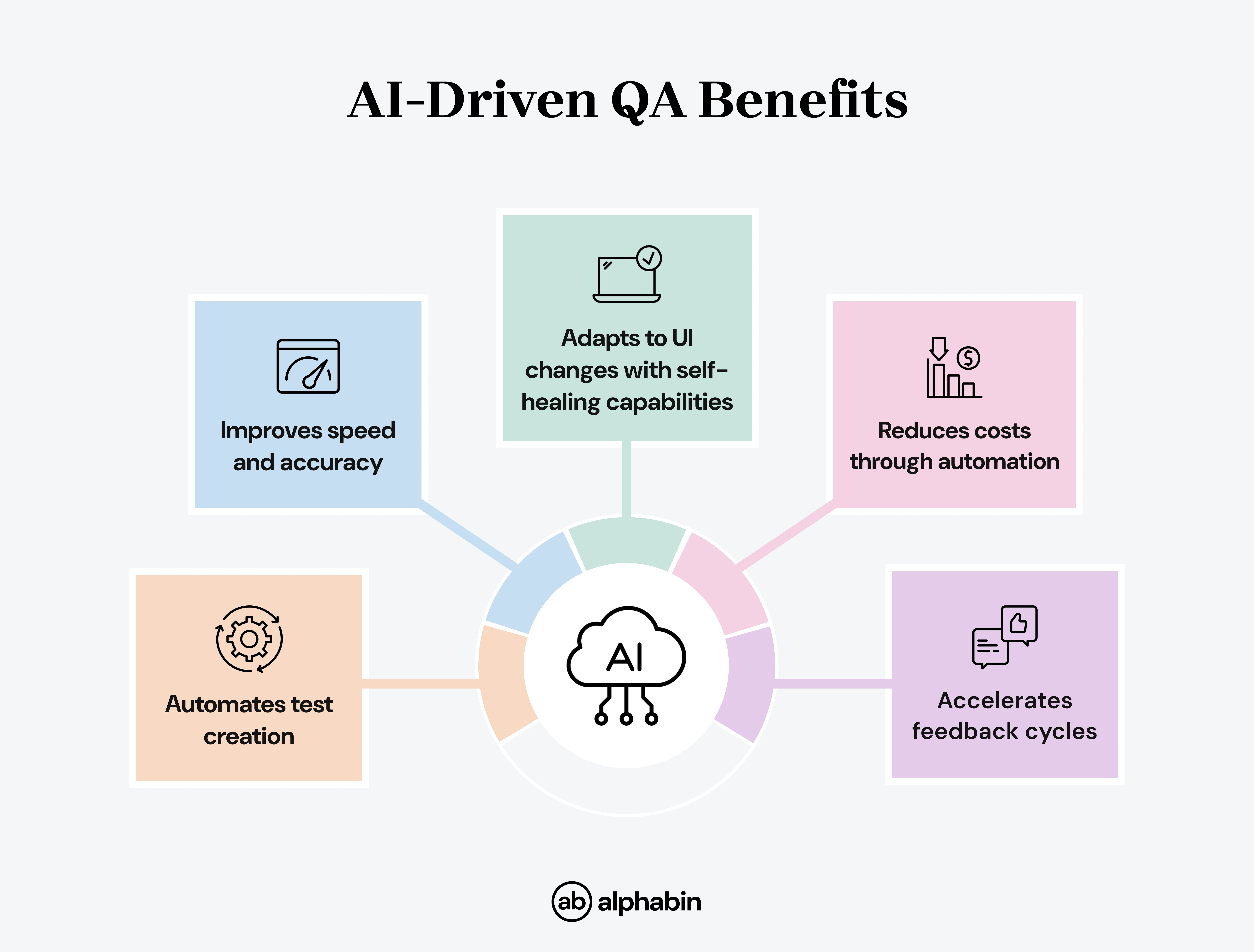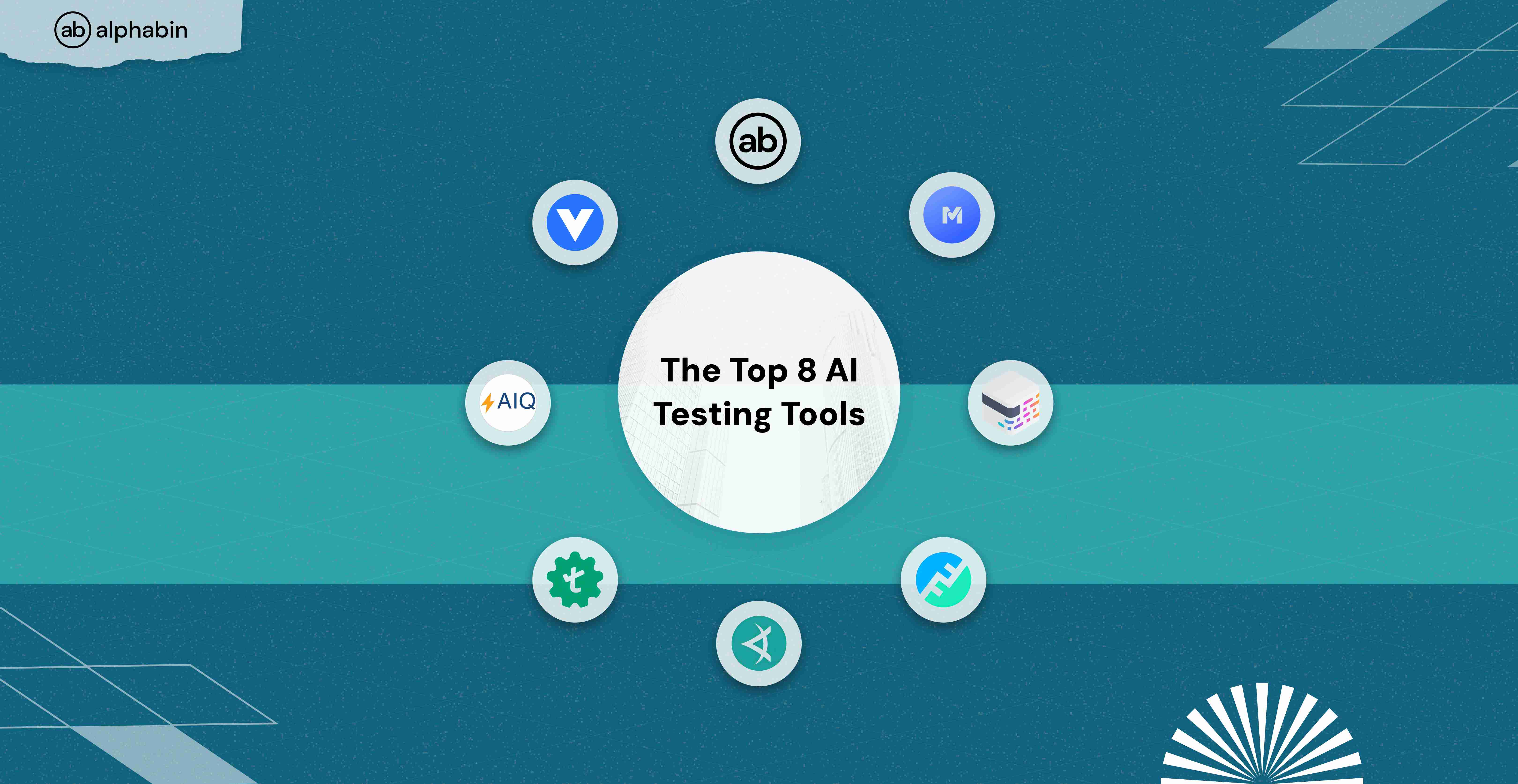Today, Quality Assurance accounts for approximately 40% of overall development costs.
Forty percent. Nearly half of your development budget is going to QA, and your best engineers are still doing repetitive work that should've been automated years ago.
Something's broken in QA, and I think I know what it is.
Alphabin’s approach to QA positions it as a leading option, on par with QA Wolf and Rainforest QA. If you're evaluating a comprehensive QA services provider for your enterprise, you should know about all three options available.
How can we help you make an informed decision? Here's what we'll cover:
Each company brings unique strengths to the table, with different approaches to pricing, speed of execution, testing capabilities, and service delivery models.
Why AI-Driven QA Automation Matters Now
Your engineering team just shipped a critical feature. Three weeks later, your QA lead walks into your office: the regression suite is broken again. Not because of bugs, but because someone updated the UI framework. Now your team needs another sprint just to fix the tests.
Meanwhile, your competitor just announced they're releasing features twice as fast as you. Their secret? They're not wasting 40% of their development budget maintaining brittle test scripts.
Here's what's killing your velocity:
Every UI change costs you a sprint. The math doesn't work. You're burning talent.
{{cta-image}}
AI changes this completely. When UIs change, AI adapts in minutes, not days. Your QA team focuses on strategy and edge cases, work that requires human intelligence. AI-driven QA automation minimizes manual intervention by automatically adjusting scripts and optimizing testing processes. Self-healing is a key feature of AI-powered automation, ensuring test reliability even as UI changes occur.
The result? Teams using AI-driven QA ship 2-3x faster with higher quality. Not because they have more testers, but because their testers aren't stuck doing robot work.

Current QA Landscape: Three Approaches
Let me break down how the industry leaders approach QA services, because understanding these differences matters more than company age or funding rounds.
QA Wolf pioneered the full-service model. They handle your entire QA process: writing tests, maintaining them, and guaranteeing zero flakes. Their approach combines AI technology with human QA engineers who become extensions of your team. They've built a strong reputation for comprehensive coverage and reliability, particularly for companies that want to outsource their QA function completely.
Rainforest QA took a different path with their no-code platform combined with dedicated test managers. They've made test creation accessible to everyone on your team while providing expert support. Their visual testing approach and AI-powered test healing have attracted companies looking for a balance between self-service and managed services.
{{blog-cta-1}}
{{cta-image-second}}
Comparison
Speed & Coverage: The Real Differentiators
I'm going to share something that might shock you. Or maybe they won't, maybe you’re living in this reality right now.
Alphabin not only delivers speed and coverage, but also focuses on optimizing test execution and streamlining testing processes to maximize efficiency.
1. Setup & Integration Timeline
Industry standards say you'll achieve 80% test coverage in 4 months. Both QA Wolf and Rainforest QA work within these timelines, with their own approaches to getting there.
At Alphabin, we leverage our proprietary TestGenX tool to write Playwright tests 5-8x faster than traditional methods. But here's the key: it's not just about the tool. It's about our experienced QA engineers who know exactly how to apply it to your specific needs.
Our approach:
- Day 1: CI/CD integration and initial test framework setup
- Week 1: Core user journey tests are automated
- Month 3: 80% coverage achieved for critical paths
2. CI/CD Integration Comparison
Traditional services often struggle with CI/CD integration, taking weeks to properly configure pipelines and establish reliable test execution.
Alphabin's advantage? We've done this hundreds of times across different industries. Our approach is designed for facilitating continuous testing by integrating automated workflows that enable continuous testing throughout the development cycle.
By leveraging test execution AI, we automate and optimize test execution within CI/CD pipelines, ensuring rapid feedback, early defect detection, and improved software quality.
Whether you're in fintech needing compliance testing, e-commerce requiring performance validation, or SaaS demanding continuous deployment, we've got the playbooks ready.
3. Coverage Achievement Metrics
Code & test coverage are not just about quantity; it's about quality. While others focus on hitting arbitrary percentages, Alphabin focuses on business-critical paths first. Our AI-powered reporting platform, Testdino, ensures that everyone from developers to executives understands exactly what's covered and why it matters.
The Test Automation Technology That Powers Modern QA
Now, let's talk about what modern QA technology delivers, not in terms of features, but in terms of business outcomes.
1. Alphabin's Technology Stack
We're not tied to a single framework or approach. Our team is proficient in:
- Playwright, Selenium, and Cypress for web automation
- Appium for mobile app testing
- REST Assured, Postman for API testing
- JMeter, LoadRunner for performance testing
- OWASP ZAP, Burp Suite for security testing
Alphabin's stack includes advanced software testing tools and AI testing tools designed to automate and optimize the QA process, featuring capabilities like self-healing, predictive failure detection, and seamless integration with CI/CD pipelines.
But tools are just tools. What matters is how we apply them. Our proprietary internal tool, TestGenX, helps us write Playwright tests 5-8x faster than the traditional approach, while Testdino provides reports and analytics that translate technical metrics
2. Service Depth vs. Tool Focus
QA Wolf and Rainforest QA have built excellent platforms. QA Wolf's Playwright-based approach and Rainforest's visual testing capabilities serve their customers well.
Alphabin takes a different approach. We're not selling you a platform.
We're delivering outcomes. Alphabin provides comprehensive AI automation testing and automated testing solutions that streamline the entire testing process and support the full testing lifecycle, from planning and test generation to execution and evaluation.
- Need blockchain testing for your Web3 application? We’ve got specialists.
- Require HIPAA-compliant testing for your healthcare app? Our teams understand the regulations.
- Want e-commerce performance testing that simulates Black Friday traffic? Consider it done.
Pricing Models & the True Cost of QA
Let's talk about what really matters to your CFO: value for money!
Alphabin’s AI-driven approach not only streamlines your testing processes but also reduces the manual effort required and shortens overall testing time.
1. Per-Test Trap
QA Wolf charges per test. Sounds reasonable until you do the math. 200 tests for $8K per month. Need 1,000 tests? That's $300K annually. That's not a pricing model. That's a growth penalty.
2. Usage Confusion
Rainforest's usage-based model ranges from $2K to $350K. That's a 175x difference. How do you budget for that? How do you plan for growth when you don't know if next month will cost $5K or $50K?
3. Alphabin: Value-Based Pricing
Alphabin's QA automation takes a different approach. We don't charge per test because we don't count tests. We count the results. Our AI can generate thousands of tests without hitting arbitrary limits.
70% cost savings isn't a marketing claim. It's math. When TestGenX writes tests 5x faster and maintains them automatically, when Testdino eliminates the need for separate reporting tools, and when you achieve coverage in weeks instead of months, the savings are real.
Real-World Performance Comparison
Numbers tell one story. Real-world performance tells another story.
1. Comprehensive Testing Capabilities
While QA Wolf focuses on web and mobile automation, and Rainforest specializes in visual testing, Alphabin delivers across the entire spectrum:
- Functional Testing: Web, mobile, API, desktop
- Non-Functional Testing: Performance, security, accessibility
- Specialised Testing: IoT, Blockchain, Web3
- Industry-Specific: Banking compliance, healthcare HIPAA, e-commerce scale
2. Integration Depth
Everyone supports GitHub, Jenkins, and GitLab. But integration goes deeper than that. Alphabin integrates with:
- Your existing test management tools
- Business intelligence platforms through Testdino
- Compliance and audit systems
- Industry-specific platforms (Salesforce, SAP, etc.)
Who Each Solution Serves Best
Every solution has its sweet spot.
QA Wolf excels for VC-backed B2B SaaS companies that want to completely outsource QA and have the budget for premium services. Their zero-flake guarantee and comprehensive coverage model work well for teams that prefer hands-off QA management.
Rainforest QA fits teams that want a balance between self-service and managed support. Their no-code platform and Test Manager model suits companies with mixed technical teams who want some control over their testing.
{{blog-cta-2}}
The Decision: Future-Proof Your QA
Here's what I believe: The QA industry is evolving beyond simple automation.
Tomorrow's winners won't just have automated tests. They'll have:
- Comprehensive quality strategies across all platforms
- Specialized expertise in emerging technologies
- Flexible engagement models that scale with growth
- Global coverage for 24/7 development cycles
The question isn't just "who can automate my tests?"
It's "Who can transform my quality engineering?"
Conclusion
Look, I could keep talking about our services and capabilities. But you know what works better?
Seeing it yourself.
Give us your most complex testing challenge. The one that keeps you up at night. Whether it's:
- Scaling test automation across 50 microservices
- Testing blockchain transactions for your DeFi platform
- Ensuring HIPAA compliance for your healthcare app
- Performance testing for millions of concurrent users
We'll show you exactly how Alphabin would approach it. Not with generic demos or sales pitches, but with a real solution for your real problems.
Our unique approach leverages AI automation testing tools to analyze user interactions and automate repetitive tasks throughout your testing process. With Alphabin, AI handles repetitive tasks like test case generation and UI testing, freeing your team to focus on complex, high-value work and ensuring your tests adapt to real user behavior.
We offer flexible engagement options because we know one size doesn't fit all:
- Free QA assessment to identify gaps and opportunities
- Pilot projects to prove our capabilities
- Strategic consultation to transform your QA practices
- Flexible contracts that grow with your needs
We bring something different: comprehensive quality engineering that adapts to your needs. We're not just another QA service. We're your partner in building better software, faster.
Because at the end of the day, it's not about having the most tests or the fastest tools. It's about shipping quality software that delights your users and grows your business.
Ready to transform your QA? Let's talk.
FAQs
1. What makes Alphabin different from other QA providers?
Alphabin offers flexible, expert-led QA services, supports specialized testing (e.g., blockchain, IoT), and uses proprietary AI tools to speed up and improve quality.
2. What types of testing services does Alphabin offer?
Alphabin covers automation (web, mobile, API), performance, security, compliance, and specialized testing, with options for consulting and staff augmentation.
3. How do Alphabin, QA Wolf, and Rainforest QA compare for startups?
- Alphabin: Highly flexible, supports advanced/niche testing, adapts quickly.
- QA Wolf: Fully managed QA, hands-off, ideal for outsourcing.
- Rainforest QA: No-code, user-friendly, mix of self-service and expert support.
4. Which QA solution is better for fast test automation deployment?
Alphabin uses proprietary tools to deploy test automation much faster than the industry standard, typically reaching high coverage in weeks.



.svg)










